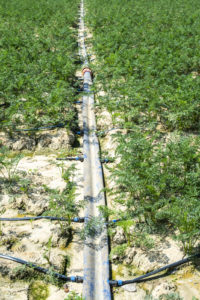Before you know it, spring will be here, and you might be planning your spring garden. The winter months are a good time to come up with a way to supplement the rain your gardens depend on. If you have ever wondered, “What is drip irrigation?” This is your chance to learn.
So What Is Drip Irrigation?
The best method to water your garden is using drip irrigation. Drip is a regulated, slow application of water to soil. The water streams under low pressure through a hose or plastic pipe placed long each row of plants.
The basic ideas behind the successful use of drip irrigation is that soil moisture stays very constant. Other watering techniques, like sprinklers and floods, create a vast fluctuation in the temperature, aeration, and soil water content of the soil. Talk with your local tree contractor from Tampa Tree Care Services for more information on other watering techniques.
Benefits of A Drip Irrigation System

Irrigation hoses on a carrot farm
The best thing about irrigation is that it just needs around half as much water as sprinkler or furrow irrigation since the water is applied drop by drop to the roots of the plant.
The financial investment in a drip irrigation system is somewhat small if you spend a couple of hours to plan, put together, and set up the system. Increased yield and quality as well as saving in water can more than pay for the costs of parts to install and upkeep a drip system.
This type of irrigation lets water trickle slowly close to the base of the plant via a system of valves, tubing, pipes, and emitters. Most systems are simple to set up. When in place, irrigation produces healthier growing conditions and higher yields while saving money and time.
Benefits of Drip Irrigation
Better plant health
Water goes deeply and slowly into the soil, putting moisture precisely where it’s needed – at the roots. Plants grow fast when they are evenly watered minus the headache made by lack of water.
Environmental benefits
Since irrigation is so efficient, there is hardly a chance of erosion.
Diminished risk of disease
Not like overhead sprinklers, this irrigation type maintains dry foliage. This diminishes the incidence of chalky mildew and other diseases that happen in damp conditions.



